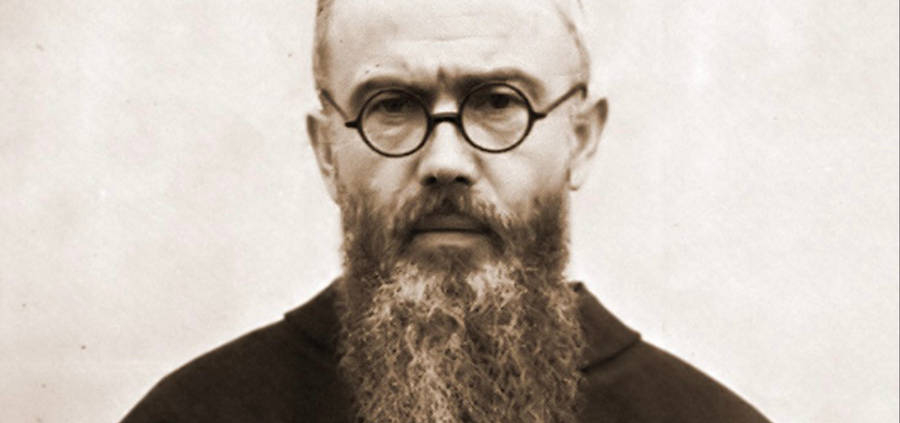We Are All Poles Now by Chris Byrd
“We are all Poles now,” Conventual Franciscan priest Maximilian Kolbe (Marcin Kwasny) says to his fellow Auschwitz prisoners in the film Triumph of the Heart. This particular solidarity merges seamlessly with heroic gospel witness in director Anthony D’Ambrosio’s unflinching yet heartrendingly beautiful and exceptional debut.
The film recalls how Saint Maximilian Kolbe (1894–1941) famously provoked Nazi authorities by offering to take the place of a married father with children who would have been executed at the notorious concentration camp. Martyred on August 14, 1941, Kolbe was canonized in 1982 by Pope John Paul II.
The American director D’Ambrosio shot Triumph of the Heart with a modest budget of $355,000, in Poland and with a largely Polish cast and crew. It premieres in theaters today.
The film opens as birds chirp and light shimmers through high treetops. A young couple, Albert (Rowan Polonski) and Margaret (Weronika Skwaron), enjoy this surprisingly idyllic moment two years prior to the film’s events.
Albert retells a fairytale for Margaret, who reminds him “that’s not how the story goes,” as D’Ambrosio jarringly plunges viewers back to the concentration camp where Albert is a prisoner.
When a prisoner escapes, camp commandant Karl Fritzsch (Christopher Sherwood), selects 10 men to starve to death as punishment. If anyone stepped out of line at Auschwitz, as Kolbe does to make his astonishing offer, he typically would have been shot. But the priest’s uncanny defiance rattles Fritzsch, who defends his decision not to shoot Kolbe. “It was an experiment,” he says.
Prisoner 16670, Kolbe threatened the Nazi regime. He ran one of Poland’s largest network of newspapers and radio stations—the Knights of the Immaculata—and as a Polish leader who countered Nazi propaganda, he was sent to Auschwitz to die.
Wanting his brothers not to lose hope, the priest emerges as the group’s leader, and he wants to organize them into a prayer militia. “We’ll pray for the camp until we can’t pray anymore,” he says. But Albert, among others, resists him. When the priest says, “We don’t have to die like animals if we fix our eyes on God,” Albert answers, “God is dead. They killed him in the first bombing.”
Scenes of Fritzsch’s domestic life—with his wife Franziska (Sharon Oliphant), son Karl (Kamil Franaszczyk), and daughter Gisela (Hanna Nowakowska), in their well-appointed, tranquil country home—alternate with the bunker scenes. But the commandant is preoccupied with the priest and how this punishment may impact his own considerable ambition. Fritzsch believes loyalty to the Reich should reward him with a more prestigious position in Berlin.
Yet an unnamed Reich minister reminds Fritzsch: “If you turn him [Kolbe] into a martyr, you might want to look into a heavier coat, because you’ll be headed to Russia, not Berlin.” The commandant, in the end, acknowledges the priest has dictated his actions. “If you hadn’t volunteered or sang your songs,” Fritzsch says to Kolbe, “perhaps I’d let your friends go free. Your love of God has condemned them.”
Kolbe’s brothers finally don’t view their fate as condemnation. At the end of their 14-day ordeal, despite political and religious differences, accusations and disagreements and suspicions, they embrace a common mantra: “Into death and beyond it.” Heaven, for these Poles, as Kolbe says, “is a fever dream” where even “Jesus himself was dancing the polka.”
D’Ambrosio’s well-paced direction and excellent, memorable script propel Triumph of the Heart. As a screenwriter particularly, D’Ambrosio scrutinizes each character’s actions and motivations to assure each moment in the film feels well-earned, honest, and true and real. Andrew Q. Holzschuh’s four-three aspect ratio cinematography, which squares the frame, enriches the intimacy of the starvation bunker scenes, where most of the film occurs.
Triumph of the Heart is replete with numerous moving and haunting images: the men seeking warmth against each other against starvation’s growing cold; the brothers wringing precious little rain water into their mouths avidly; and the tender forgiveness offered to Jonas (Oleg Karpenko) by Kolbe after Jonas acknowledges betraying him to Nazi officials.
The film isn’t for the squeamish, however. Increasingly delusional and paranoid and desperate, the men engage in behavior some viewers may not want to watch. For those who can stomach it, however, Triumph of the Heart will amply reward them. Ranking with the best films about saints—Roberto Rossellini’s Flowers of St. Francis, Otto Preminger’s Saint Joan—Triumph of the Heart is just that. ♦
Chris Byrd is the author of Sisters: The Extraordinary Lives of Serena and Anna Marie Branson.





Leave a Reply
Want to join the discussion?Feel free to contribute!